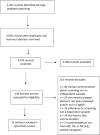Impact of provider-patient communication on cancer screening adherence: A systematic review
- PMID: 27687535
- PMCID: PMC5518612
- DOI: 10.1016/j.ypmed.2016.09.034
Impact of provider-patient communication on cancer screening adherence: A systematic review
Abstract
Cancer screening is critical for early detection and a lack of screening is associated with late-stage diagnosis and lower survival rates. The goal of this review was to analyze studies that focused on the role of provider-patient communication in screening behavior for cervical, breast, and colorectal cancer. A comprehensive search was conducted in four online databases between 1992 and 2016. Studies were included when the provider being studied was a primary care provider and the communication was face-to-face. The search resulted in 3252 records for review and 35 articles were included in the review. Studies were divided into three categories: studies comparing recommendation status to screening compliance; studies examining the relationship between communication quality and screening behavior; and intervention studies that used provider communication to improve screening behavior. There is overwhelming evidence that provider recommendation significantly improves screening rates. Studies examining quality of communication are heterogeneous in method, operationalization and results, but suggest giving information and shared decision making had a significant relationship with screening behavior. Intervention studies were similarly heterogeneous and showed positive results of communication interventions on screening behavior. Overall, results suggest that provider recommendation is necessary but not sufficient for optimal adherence to cancer screening guidelines. Quality studies suggest that provider-patient communication is more nuanced than just a simple recommendation. Discussions surrounding the recommendation may have an important bearing on a person's decision to get screened. Research needs to move beyond studies examining recommendations and adherence and focus more on the relationship between communication quality and screening adherence.
Keywords: Breast cancer; Cancer screening; Cervical cancer; Colorectal cancer; Professional-patient relationship; Review, systematic.
Copyright © 2016 Elsevier Inc. All rights reserved.
References
-
- Whitlock EP, Vesco KK, Eder M, Lin JS, Senger CA, Burda BU. Liquid-Based Cytology and Human Papillomavirus Testing to Screen for Cervical Cancer: A Systematic Review for the U.S. Preventive Services Task Force. Ann Intern Med. 2011;155(10) 687-W-215. - PubMed
-
- Levin B, Lieberman DA, McFarland B, Smith RA, Brooks D, Andrews KS, et al. Screening and Surveillance for the Early Detection of Colorectal Cancer and Adenomatous Polyps, 2008: A Joint Guideline from the American Cancer Society, the US Multi-Society Task Force on Colorectal Cancer, and the American College of Radiology CA. Cancer J Clin. 2008;58(3):130–60. - PubMed
-
- Whitlock EP, Lin JS, Liles E, Beil TL, Rongwei F. Screening for Colorectal Cancer: A Targeted, Updated Systematic Review for the U.S. Preventive Services Task Force. Ann Intern Med. 2008;149(9):638–58. - PubMed
-
- Moyer VA. Screening for Lung Cancer: U.S. Preventive Services Task Force Recommendation Statement. Ann Intern Med. 2014;160(5):330–8. - PubMed
Publication types
MeSH terms
Grants and funding
LinkOut - more resources
Full Text Sources
Other Literature Sources
Medical


